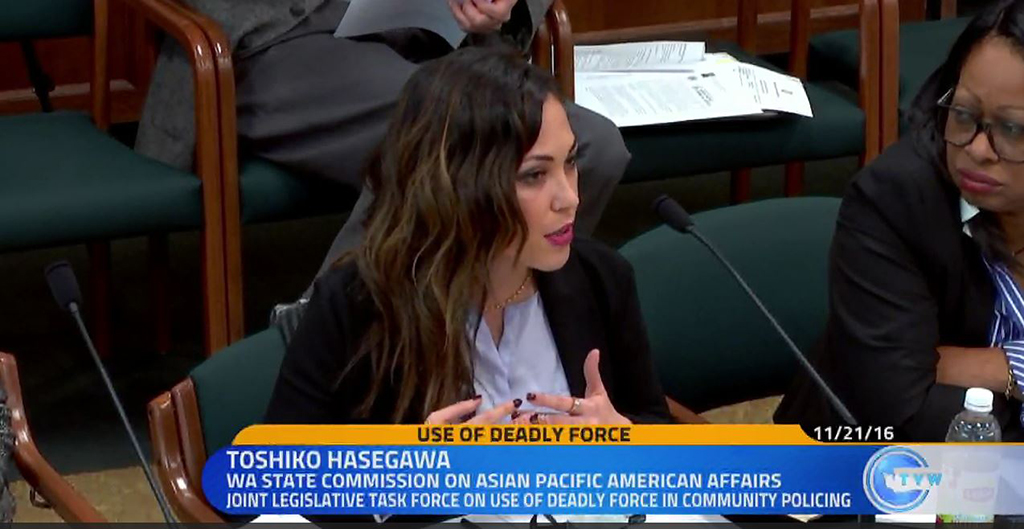By Arlene Kiyomi Dennistoun
NORTHWEST ASIAN WEEKLY

Toshiko Hasegawa gives her testimony on Nov. 21, 2016.
The Joint Legislative Task Force on the Use of Deadly Force in Community Policing wrapped up its final meeting in a grueling 11-hour session in Olympia, and recommended changing the law applying to police use of deadly force. Suspense grew as each member cast their vote out loud. The recommendation passed in a 14-10 vote.
The recommended change removes proof of malice and a lack of good faith when police use deadly force and opens police up to criminal charges when unreasonably or unnecessarily using deadly force. Prosecutors had shied away from charging police based on the three bullet-proof words — “malice” and “good faith” — in the current law because they couldn’t overcome the burden of proving it beyond a reasonable doubt.
Law enforcement committee members had rejected the proposal to change the law. They argued police should never have to worry about being held criminally liable for using deadly force and proposed to leave the law as is. That proposal failed by a 14-4 vote. Law enforcement members argued that if police had to worry about criminal charges whenever they make a mistake using deadly force, it would have a chilling effect, and police may hesitate to respond to calls.
Toshiko Hasegawa, representing the Commission on Asian Pacific American Affairs (CAPAA), told the committee she honestly felt threatened to hear that if the law changed, police would be deterred from responding. “Whether it’s because you’re afraid or whether it’s out of protest, if you’re not prepared to perform the functions of your job, then you’re not prepared to put on the uniform.” Hasegawa had held multiple community meetings to gather feedback and she heard from the community that the law needed changing. The current law makes it impossible to prosecute cops, said Hasegawa, and this “doesn’t resonate justice. In the interest of fortifying trust, it’s urgent and necessary to change the law.” Without a change, Hasegawa said, distrust between law enforcement and the community would continue.
The task force discussed and painstakingly voted on over 20 different proposals. Members emphasized they recognized a change in the current law was not a single magic solution to improving relations between the community and police, and would not by itself reduce the number of fatal encounters involving police use of force. The group affirmed multiple times at every meeting that police do a great job and receive valuable training, but could always use more. No one disagreed about how dangerous and difficult police work is, members praised the excellent job they do, and echoed sentiments of their desire to ensure their continued safety.
Other proposals included more law enforcement funding and training, data collection, deadly use of force reporting to the Attorney General’s Office, increased accountability of police practices, increased diversity of police officers, addressing implicit bias, and improving the behavioral health system.
The task force forwarded its final report dated Dec. 1 to Gov. Jay Inslee and the Legislature. By Dec. 5, Sen. John McCoy dropped Senate Bill 5000 for the 2017 legislative session, which removes the “malice” and “good faith” barriers to holding law enforcement officers criminally liable when unreasonably or recklessly using deadly force.
Despite the controversy, committee members displayed an unwavering commitment to getting the job done. Task force members were professional and civil, even while delivering messages tinged with undertones of suspicion, bitterness, sadness, and defensiveness.
The community is invited to learn about the task force’s final recommendations on Jan. 5 at Emerald Queen Casino in Fife. For more information, visit the CAPAA website at capaa.wa.gov.
Arlene can be reached at info@nwasianweekly.com.



